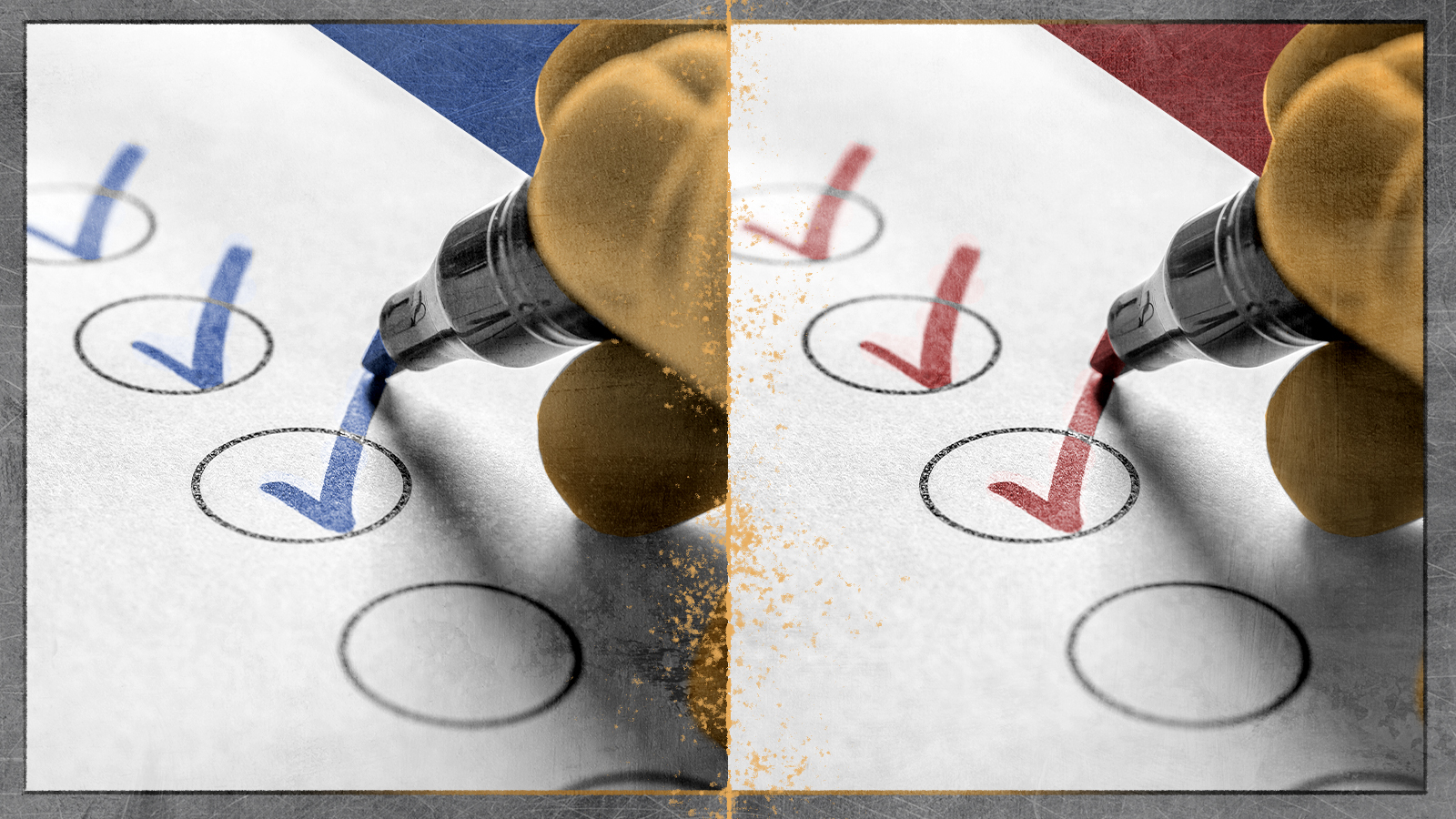How polling averages could be underestimating the Democrats
Are Republican survey firms skewing midterm predictions?


A free daily email with the biggest news stories of the day – and the best features from TheWeek.com
You are now subscribed
Your newsletter sign-up was successful
With less than a week to go before voters head to the polls in the U.S., the outcome of the race is more in doubt than in perhaps any midterm election in recent memory.
Conflicting signals abound. Republicans have improved their standing by a point or two in averages of the generic ballot since the summer, which asks voters whether they will choose Democrats or Republicans for Congress. Just as Democratic fortunes seemed to magically turn around after the Dobbs decision that overturned Roe v. Wade, the GOP is riding a bounce from the disappointing October inflation report. Yet post-Dobbs special elections, which have often been predictive of the outcome in November, suggested something close to a fully neutral, if not a Democratic-leaning national environment, while internal polls for House candidates are reportedly pointing to a bloodbath for Team Blue.
It is in this environment of uncertainty that some analysts are taking a fresh look at the polling and asking whether Republican-aligned pollsters might be distorting the polling averages that forecasters are relying on to make their predictions. Here's everything you need to know:
The Week
Escape your echo chamber. Get the facts behind the news, plus analysis from multiple perspectives.

Sign up for The Week's Free Newsletters
From our morning news briefing to a weekly Good News Newsletter, get the best of The Week delivered directly to your inbox.
From our morning news briefing to a weekly Good News Newsletter, get the best of The Week delivered directly to your inbox.
Why do some experts think Republican-leaning pollsters are distorting polling averages?
As computer scientist Laskshya Jain notes at Split Ticket, there are an unusually large number of partisan firms polling state and national elections this year. And those Republican-aligned firms are seeing a very different race for Congress than non-partisan pollsters.
In one version of the story, Republicans are on track to win the national popular vote for the House by 3 points, which would comfortably deliver the lower chamber and make them the favorite to win the Senate, too; but non-partisan polls point to a "dead heat" that gives Democrats a fighting chance to retain one or even both branches of Congress.
Jain, who thinks Republicans will win the House and that the Senate is a toss-up, is careful to note that he's not endorsing the idea that the non-partisan pollsters are right and the Republican groups are wrong. But he and his colleagues created a separate poll tracker that only includes well-regarded non-partisan polls and excludes partisan pollsters like Insider Advantage on both sides, including Democratic outfits like Data For Progress. As of this morning, that aggregator shows Republicans leading the generic ballot narrowly.
What is the Trafalgar Group?
The most prolific of the GOP pollsters is called the Trafalgar Group, and the organization's leader, Robert Cahaly, somewhat famously refuses to share its surveys' "cross-tabs" — where you can see how Black, Latino, or young voters intend to vote, according to the survey. And while his group may have gotten close to the margins in some high-profile races, Cahaly was also adamant that Trump would win in 2020 with Arizona, Michigan, and Pennsylvania going for the Republican instead of Joe Biden.
A free daily email with the biggest news stories of the day – and the best features from TheWeek.com
The Trafalgar Group has put out a generic ballot poll roughly every two weeks, and it always features prominently in the RealClearPolitics polling averages. Ditto the weekly poll from Rasmussen Reports, an ostensibly non-partisan poll that nevertheless consistently finds Republicans doing better than other organizations. Trafalgar is also all over the Senate and gubernatorial polling, releasing polls in just about every competitive race in the country, from the Oregon and Arizona governor's contests to Senate battles in North Carolina, Pennsylvania, and Georgia. If Trafalgar is deliberately or accidentally getting the electorate wrong, it is having huge effects on election forecasts.
Is there anything else that looks odd about this year's midterm polls?
Indeed, it's not just Republican pollsters. Even what Jain calls "gold standard" non-partisan pollsters are showing some odd numbers that are working against Democrats. For one thing, several prominent generic ballots polls just in the last week show Democrats winning less than 80 percent of the Black vote, which would be unprecedented. Even in GOP wave election years like 2010 and 2014, Democrats held steady with Black voters, winning roughly 9 of 10, according to exit polls.
A shift of this magnitude of Black voters to the GOP would indeed be a seismic event in American politics, one that would make it much less likely for Democrats to consistently win national elections. But there are good reasons to be skeptical of these findings, not least of which is that Democratic performance with Black voters has remained consistent for decades. The last time fewer than 80 percent of Black voters chose the Democratic candidate for president, for example, was in 1960. An analysis of early voting data by Democratic strategist Simon Rosenberg also suggests that Democrats are poised to blow their polling out of the water almost across the board.
What does this all mean for next Tuesday?
Democrats are about to defy both recent election history and the polls, right? Not so fast. The history of speculating about systematic polling error is not great. In 2004, left-leaning bloggers believed that Democratic nominee John Kerry would beat his polls, which showed incumbent President George W. Bush winning re-election narrowly, by turning out younger voters in higher numbers than surveys suggested. That didn't happen.
In 2012, a blogger named Dean Chambers started "unskewing" polls that he thought undersampled Republican voters. Instead, it was incumbent President Barack Obama and down-ballot Democrats who overperformed, probably because likely voter screens didn't capture the low-propensity voters who ended up turning out for him. Chambers had predicted a Romney victory in the Electoral College of 275-263, because, as he told New York magazine's Eric Benson, "Many of us believed that the electorate was going to look more like 2010 rather than 2008." Believing that the electorate should look like something other than what the polling tells you it will look like is a hallmark of this kind of analysis, and it is usually wrong.
It also happens to be the case that Trafalgar has had a particularly good track record in recent years, so much so that FiveThirtyEight assigned the group an A- rating — better than well-regarded pollsters like Marquette University Law School, Fox News/Opinion Dynamics, and even the august Gallup, which pioneered the science of polling in the 1930s and 1940s. While they may not be especially forthcoming with their methodology, it is hard to argue with the results over the past several cycles.
If that leaves you more uncertain than ever about who is likely to win control of Congress, governor's seats, and state legislatures next week, you're not alone.
David Faris is a professor of political science at Roosevelt University and the author of "It's Time to Fight Dirty: How Democrats Can Build a Lasting Majority in American Politics." He's a frequent contributor to Newsweek and Slate, and his work has appeared in The Washington Post, The New Republic and The Nation, among others.
-
 6 of the world’s most accessible destinations
6 of the world’s most accessible destinationsThe Week Recommends Experience all of Berlin, Singapore and Sydney
-
 How the FCC’s ‘equal time’ rule works
How the FCC’s ‘equal time’ rule worksIn the Spotlight The law is at the heart of the Colbert-CBS conflict
-
 What is the endgame in the DHS shutdown?
What is the endgame in the DHS shutdown?Today’s Big Question Democrats want to rein in ICE’s immigration crackdown
-
 The billionaires’ wealth tax: a catastrophe for California?
The billionaires’ wealth tax: a catastrophe for California?Talking Point Peter Thiel and Larry Page preparing to change state residency
-
 Bari Weiss’ ‘60 Minutes’ scandal is about more than one report
Bari Weiss’ ‘60 Minutes’ scandal is about more than one reportIN THE SPOTLIGHT By blocking an approved segment on a controversial prison holding US deportees in El Salvador, the editor-in-chief of CBS News has become the main story
-
 Trump’s poll collapse: can he stop the slide?
Trump’s poll collapse: can he stop the slide?Talking Point President who promised to ease cost-of-living has found that US economic woes can’t be solved ‘via executive fiat’
-
 Has Zohran Mamdani shown the Democrats how to win again?
Has Zohran Mamdani shown the Democrats how to win again?Today’s Big Question New York City mayoral election touted as victory for left-wing populists but moderate centrist wins elsewhere present more complex path for Democratic Party
-
 Millions turn out for anti-Trump ‘No Kings’ rallies
Millions turn out for anti-Trump ‘No Kings’ ralliesSpeed Read An estimated 7 million people participated, 2 million more than at the first ‘No Kings’ protest in June
-
 Ghislaine Maxwell: angling for a Trump pardon
Ghislaine Maxwell: angling for a Trump pardonTalking Point Convicted sex trafficker's testimony could shed new light on president's links to Jeffrey Epstein
-
 The last words and final moments of 40 presidents
The last words and final moments of 40 presidentsThe Explainer Some are eloquent quotes worthy of the holders of the highest office in the nation, and others... aren't
-
 The JFK files: the truth at last?
The JFK files: the truth at last?In The Spotlight More than 64,000 previously classified documents relating the 1963 assassination of John F. Kennedy have been released by the Trump administration
